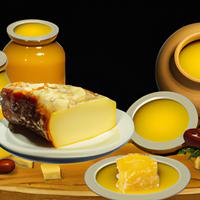
1 serving (21 grams) contains 64 calories, 0.1 grams of protein, 0.0 grams of fat, and 17.3 grams of carbohydrates.

Log this food in SnapCalorie

Nutrition Information
Calories |
725.5 | ||
|---|---|---|---|
% Daily Value* |
|||
| Total Fat | 0 g | 0% | |
| Saturated Fat | 0 g | 0% | |
| Polyunsaturated Fat | 0 g | ||
| Cholesterol | 0 mg | 0% | |
| Sodium | 9.5 mg | 0% | |
| Total Carbohydrates | 196.6 g | 71% | |
| Dietary Fiber | 0.5 g | 1% | |
| Sugars | 195.9 g | ||
| protein | 0.7 g | 1% | |
| Vitamin D | 0 mcg | 0% | |
| Calcium | 14.3 mg | 1% | |
| Iron | 1.0 mg | 5% | |
| Potassium | 124.1 mg | 2% | |
* Percent Daily Values are based on a 2,000 calorie diet. Your daily values may be higher or lower depending on your calorie needs.
Food Attributes
Source of Calories
About Honning
Honning, or honey, is a natural sweetener made by bees from flower nectar. Famous for its golden hue and distinct sweetness, it has origins in global culinary traditions, particularly in Mediterranean, Middle Eastern, and Nordic cuisines. Rich in antioxidants, honey can help combat oxidative stress and support immune health. It contains trace amounts of vitamins, minerals, and bioactive compounds, including flavonoids and phenolic acids. Known for its antimicrobial properties, honey has long been used in folk medicine for wound healing and soothing sore throats. However, its high natural sugar content makes it calorie-dense, and overconsumption may contribute to weight gain or blood sugar spikes. Raw or organic varieties are considered the most nutritious, as they retain more enzymes and nutrients. Versatile in recipes, honeys differ in flavor depending on the flowers visited by bees, making it a cherished staple in kitchens worldwide.



